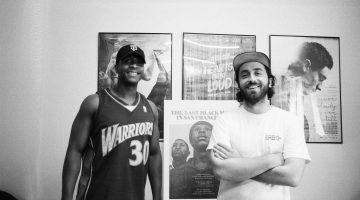Jake Gyllenhaal on Nightcrawler, crafting a character, and morality.
It’s a rare moment when an actor delivers a performance not just to his own best ability, but who also creates a character that will go down in movie history. Jake Gyllenhaal has arguably done this with his latest film, Nightcrawler, where he plays Lou Bloom, an ambitious man who strikes a sudden passion as a videographer, filming crime scene footage to make money and gain high profile success. Scene Creek had the unparalleled opportunity to sit down with Jake Gyllenhaal, one of our generation’s strongest actors, whose filmography has become increasingly intriguing, all the way up to his soon to be iconic performance as Lou Bloom. Jake discusses many aspects of the film with us, and as he also has producing credits, he let’s us know what it was like to not just play the character but to have an impact on the film itself.
Nightcrawler is a character study, but through Lou Bloom, we also all get to explore another side of ourselves, and the society that we live in. In a world dominated by news media, negativity, and ultimately an obsession with tragedy, Nightcrawler is a film that is relevant throughout the ages-as this is not a new problem, but one that it’s time we acknowledge. Jake says of the film, “It obviously offers the opportunity to have a current, political, discussion about media because it’s a way in, and it’s an avenue, and his job and how he gets in offers that. I did a lot of research in that world.” For Jake, however, this film is so much more about Lou as a character, “To me, it’s so much about how we’ve created this person. And how he is really our creation. All day people have given him different names, people are like he’s “creepy” or he’s a “sociopath” or he’s a “psychopath” and what’s interesting is that the reason I wanted to do the movie, is because it was a way of exploring a side of myself [or] a piece of myself, [because] a side connotes like 50%” Jake laughs. “I’m intrigued in the same way that he is, that I would be driven in a similar way. I think that Dan puts forth this character so that we can all face a piece of ourselves, that’s fascinated with tragedy.”
Through Lou Bloom, who as Jake says, people may interpret as a sociopath or psychopath because of his complete lack of compassion or empathy, the audience becomes faced with this piece of themselves that is similar to Lou-the person who is desensitized to violence, to evil, and to a world that is filled with tragic events. Through Lou, we can analyze our fascination with these events, yet often, our own lack of compassion or understanding. It is thanks to the film’s screenplay that this is not just a character study, but an intricate meditation on humanity as a whole. As Jake says, “A movie like this, moralistically, you need a lot of eyes on it. The structure of the screenplay is intact in the film so strongly. It was so strong. There were things even last night that occurred to me, things in the original screenplay that lined up so well, that I had my eye on, that I saw last night [at the TIFF premiere]. Yes, for me, it’s a really interesting question because as an actor and as a producer, I made many, many choices. Dan and I would walk through lines all the time. You know when he’s [Rick, played by Riz Ahmed] filling up the gas tank, filling the new car at the station? Well, I go down to him in the car and I say, “You know, you just poured gas on the car and if you do that again I’ll have to terminate you.” That whole line? So we did like six takes of that. In two of the takes I was screaming my fucking head off at him. You know what I mean? The next take was probably the take that was used. We were all over the map. When you get to a scene like the scene in the mirror, how did that happen? We were doing that all over the place. How far can this guy go? Can he push that hard all the way over and will you still like him? OK, now let’s make him the most charming. And somewhere sometimes, I’d say maybe we use some of that. There was constantly a conversation and I was always pushing.”
The intricacy of Lou Bloom is that he’s an anti-hero. Despite how compassionless he is, you still root for him and want him to succeed. He can be equally as charming as he can be creepy. Jake explains how in the short amount of time they had to shoot, they would just try lines in many different ways and this method helped establish the character “The very first scene where I fight the guy with the watch. We shot me beating the shit out of the guy, and it just didn’t [work]…and there was still some arguments of whether you should ever even see the watch, and if you really got to see me with the watch at the end. But it was like me saying to Dan, “where’s that watch?” All of those questions are constantly going on.”
Another example Jake gives is his scene with Bill Paxton, “When I say to Bill Paxton ‘I want to grab you by the ears right now and scream in your face I’m not fucking interested’ I did that scene many many times. We did many different variations of emotions because we didn’t know what this guy was going to do, and we didn’t map it out because we didn’t have enough time. We have 25 days, so we couldn’t go, ‘let’s explore this.’ We were going “throw that in a bucket, throw that in a bucket, throw that in a bucket, let’s go!” It was like that the whole time.”
It doesn’t seem to have hurt the film at all that the shoot was so short, because it looks as though Jake Gyllenhaal and director Dan Gilroy have still managed to craft an incredible film, that Jake insists took a lot of collaboration with his director, “Throughout the process it was always that kind of conversation. This is the interesting thing, to Dan being a great director, because people consider great directors to be total auteurs, but he was a fearless collaborator. The ideas came, and he would say no to many of my ideas. But he knew when something good came up. When we were shooting—I memorized the whole movie like a play. Because I knew we were shooting in 25 days, and if I wasn’t agile with those soliloquies, we were going to be fucked. We couldn’t waste time, so it was memorized. What we would do when we were on a set up and we had a camera, I asked Dan if we could do the monologues into camera, and in different locations we would shoot me doing it into the camera. He later cut that together and marketed the movie, there are a couple of trailers already with me speaking into camera. That comes from me just saying, “can I do speeches into camera?” That kind of stuff Dan encouraged all the time. Then I said to Dan one time, what if I put my hair up? And he was like “I love that! Yeah, yeah, do it!” I don’t know if it was funny because when I was here last time for Prisoners, Dan was like the twitches you were doing man[ in Prisoners], and I was like maybe I should put my hair up. That’s such a good thing. He was so encouraging and he was always collaborating in that way and not afraid and not pushing ideas away or anything. He’s so thoughtful.”
As for the actual experience of Lou Bloom’s job, Jake explains how he actually learned a lot on the set of a different film, End of Watch, which had him playing a police officer alongside Michael Pena, “it was fascinating. I had done a lot of research when I did this film, End of Watch, with police offers on the street for many, many months, and there were a number of times when my publicist would get many calls because we would be on a crime scene and they would video tape us with the police offers there, they’d be like, what are Michael Pena and Jake Gyllenhaal doing? And soon they [the police] started to understand the world that we were in, the research and stuff. So I was on the inside of that. So I saw these stringers all the time on that movie. Then when I worked with the stringers on this movie, I was like totally on the outside. They’d be like “fuck off.” But their world is fascinating cause there’s so many scanners in their car. I had never heard like fire department radio stuff, you have every sort of county on every scanner and you have scanners scanning through scanners. Their mobility at night, the way they use their hearing senses and also when they are driving like 120 miles per hour to where they need to get. They have station points you know. I thought it was extraordinary. And then you know, they are searching for the worst possible thing.”
That is what Nightcrawler delivers, a look at the worst possible moments that humanity goes through, and how we observe them as a society. This is something that we are subjected to on a day to day basis and that we often do not give much thought about-which is why this film is as important and relevant as it is. Jake Gyllenhaal gives an incredible performance that delves into a darker side of humanity while testing his moral boundaries. Make sure to see NIghtcrawler when it is released on October 31st, because it is guaranteed to open your eyes not just to an incredible film, but to make you think harder about the world that we live in.






